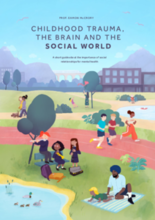This guide aims to share some of the latest research findings with those who are working every day to support children who have experienced complex trauma in the form of maltreatment. The previous guide on Childhood Trauma and the Brain gave an overview of how childhood trauma can affect brain development, and how this in turn can lead to mental health problems. Here, the authors unpack in more detail how these brain changes can affect a child’s social world, and why this is important in helping us understand the mental health of children and young people who have experienced maltreatment.
Supportive social relationships are key to good mental health for everyone. To understand why maltreatment increases a child’s risk of later mental health problems, it is important that we consider how such experiences can affect social relationships. Early abuse and neglect can impact brain development and this can affect the way a child interacts with the people around them, and how people in turn respond to a child. Over time, this can mean that a child’s social world can become more stressful, with fewer trusted relationships – increasing a child’s vulnerability to mental health problems.
Related content:

